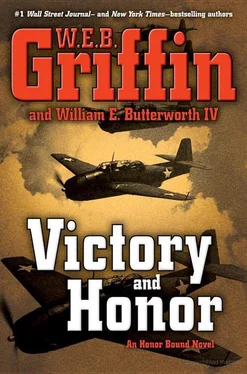Frade had a very unkind thought.
The naïve goddamn fool thinks he’s Sir Galahad bravely facing a hero’s death in the defense of his country.
And the other two are eager to jump on their horses, unsheath their swords, and ride out with him to die nobly while trying to slay the dragon.
The problem is that Delgano and Peralta and Vega have no idea what the dragon really looks like. None of them has ever been shot at, or seen an aircraft enveloped in flames—much less been in one that’s on fire—or seen an out-of-control, blazing aircraft turn into a huge ball of flame either before or after it crashed into the ground.
“There is one other factor bearing on our little problem,” Frade said sarcastically.
“Which is, Colonel Frade?” Mattingly asked, his tone suggesting he hadn’t heard the sarcastic tone or was ignoring it.
“What about the Nazis in Berlin whom some people—including me and the Secret Service—think Argentina’s secretary of Labor and Retirement Plans intends to fly out of Berlin to sanctuary in Argentina?”
“Who’s the secretary of whatever you just said?” Mattingly asked.
“Tell me about that, please,” Gehlen said.
“El Coronel Juan Domingo Perón,” Frade explained. “He’s behind this rescue-the-diplomats operation, which I don’t think has anything to do with rescuing diplomats.”
“What do you think the purpose is, Colonel?” Gehlen asked.
“Sir, I believe—and so does, apparently, Secretary of the Treasury Morgenthau—that the purpose of the rescue-the-diplomats mission is to bring some Nazis, probably high-ranking ones, from Germany to Argentina.”
“I can’t agree that it’s the primary purpose,” Gehlen said. “But I agree that it has something to do with getting former high-ranking officials of the Third Reich out of Germany. I wasn’t aware of Morgenthau’s interest. Are you sure about that, Colonel Frade?”
“Yes, sir. Absolutely. When we were at the Val de Cans air base in Brazil, a planeload of Secret Service agents was there waiting for clearance to come here. The commanding general told me that agents had been roaming the base asking junior officers and enlisted men if they’d seen anything that looked like it could be a Nazi smuggling operation. For what it’s worth, they were traveling in an Air Forces C-69—a Constellation—the same massive aircraft that I flew over here. The usual means of flying government officials to Europe is by the much slower method of C-54s across the North Atlantic.”
“Do you think Mr. Morgenthau has any suspicions vis-à-vis my people, Colonel Frade?”
“I have no reason to think so, sir. But that does not mean we’re not operating on the possibility he might.”
Mattingly put in: “In other words, he’s fishing? The Secret Service agents were fishing?”
“Yes, sir. At this point, that’s what I would guess.”
General Gehlen said, “When I heard about your flight, Colonel Frade . . . Are you interested in my uninformed scenario?”
“Yes, sir,” Mattingly and Frade said speaking on top of each other.
Gehlen nodded once, then went on: “I wasn’t aware of the OSS connection. I wondered what the real purpose of the flight might be. I didn’t think it had anything to do with rescuing diplomats. And what I decided was most likely was that since actually taking former Nazi officials aboard the aircraft on its return flight would be dangerous, the Argentine diplomats probably were carrying with them in their luggage a large number of passports.”
“Passports?” Clete blurted.
“Yes. Blank passports. Argentine certainly, but probably also Uruguayan and Paraguayan as well. Someone equipped with such a passport wouldn’t be afforded the luxury of a twenty-four-hour flight to Buenos Aires, but he could make his way to a port in a neutral country—Sweden, for example, or Spain—and there board a ship bound for South America. It would take a little longer, but it would reduce his chances of being questioned.”
“Passports never entered my mind,” Clete said.
“That’s only a possibility,” Gehlen said.
“If someone—these Secret Service agents,” Mattingly said thoughtfully, and then interrupted himself. “So far as I know—and I would be on the list of people to be notified—Secretary Morgenthau has not told SHAEF he’s sending the Secret Service.
“What I was about to say is that if somehow it came out that these Argentine diplomats have, say, two hundred passports with them, they would say, ‘Of course, that’s what embassies and consulates do, issue passports to their nationals, if the original has expired or been lost.’”
“Well, the passports went right over my head,” Clete said. “But the other thought that I had was that no one—certainly not Argentine customs—is going to go through the luggage of heroic, just-rescued diplomats to see if they might contain a couple of kilos of diamonds.”
General Gehlen said: “If we rate my passport scenario on a one-to-ten scale and it’s a five, then I would say the transport of valuables—or even currency—is an eight or nine. Allen Dulles told me that, as it became increasingly apparent that Germany was losing the way, the Swiss became increasingly concerned that one could accuse them of helping the Nazis conceal funds.”
“Where are Morgenthau’s Secret Service agents now, Clete?” Mattingly asked. “Do you know?”
Frade shrugged.
“General Bendick told me they were supposed to be on the ground at Val de Cans only long enough to take on fuel, but then there was a message saying to wait for further orders. They were still there when we took off. I have no idea where they might be.”
“There’s something about these Secret Service agents that’s not right,” Mattingly said. “Something that bothers me. It goes without saying that Eisenhower—SHAEF—would do everything possible to keep Nazis from escaping to South America. And SHAEF has the assets to do so.”
“And Eisenhower would be unlikely to ask for Secretary Morgenthau’s assistance?” Gehlen asked.
“Exactly,” Mattingly said.
“And if Morgenthau offered Eisenhower his Secret Service agents?” Gehlen asked.
“Ike would say, ‘Thank you just the same, Mr. Secretary, but I can handle this myself.’”
“Which leads us . . . where?”
“I’m not trying to suggest that Ike is in any way lackadaisical about arresting and bringing to trial the Nazis,” Mattingly said. “But I don’t think it would be unfair to suggest that Morgenthau doesn’t think Ike has a passion—the necessary, in Morgenthau’s judgment, passion—to deal with the Nazis. Morgenthau’s passion is that of a Jew, and God knows they have the right to be passionate.”
“So Morgenthau is sending assistance, whether or not General Eisenhower wants it?” Gehlen asked softly.
Mattingly nodded. “I think there would have to be a subterfuge. Morgenthau knows he can’t challenge the authority of the Supreme Commander. But some second assistant deputy secretary of the Treasury could take it upon himself to send a planeload of financial experts—who just happened to be Secret Service agents—to look into the financial records of the Third Reich. This would not come to Eisenhower’s personal attention, but rather to a one-or two-star in military government, who would presume it was authorized—”
“And some Air Forces brigadier,” Frade interjected, “sympathetic to Morgenthau’s problem could arrange for the Air Forces Constellation . . .”
“Which would fly via Brazil . . .” Mattingly picked up.
“Once someone in Europe thought it was time—in other words, safe—for the Connie to arrive in Berlin . . .”
Читать дальше












